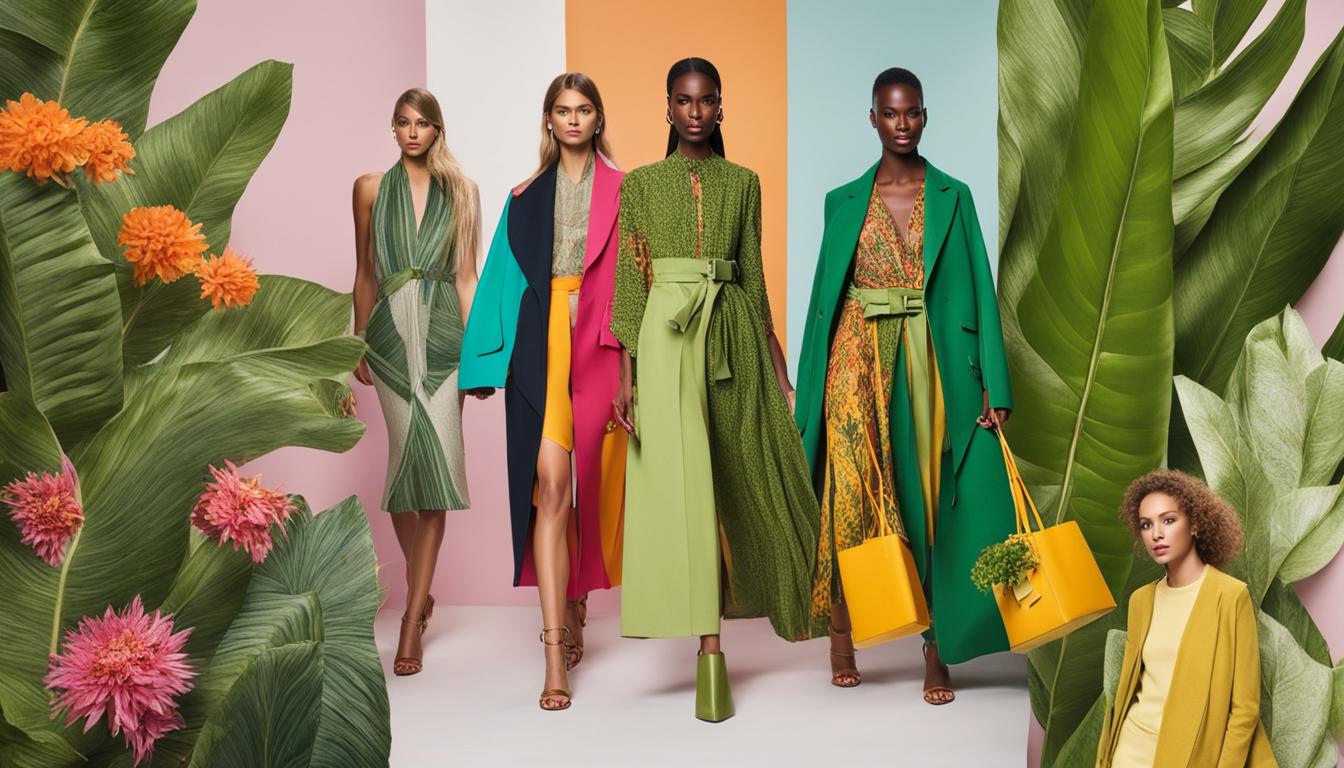As the fashion industry continues to face scrutiny for its detrimental impact on the environment and labor conditions, consumers are increasingly demanding sustainable alternatives. This article explores the top sustainable fashion brands that are leading the way in creating eco-friendly and ethical clothing options. These brands prioritize sustainable practices in their production processes, materials sourcing, and supply chains.
Key Takeaways
- Sustainable fashion brands are prioritizing eco-friendly and ethical practices in their production processes.
- These brands are leading the way in creating clothing options that have a positive impact on the environment and labor conditions.
- Sustainable fashion trends are focused on creating timeless designs and high-quality essentials that reduce the need for constant consumption.
- Affordable sustainable fashion brands are making sustainable clothing accessible without compromising on style or quality.
- Size-inclusive sustainable fashion brands are catering to all body types and ensuring everyone can find sustainable clothing that fits their style and size.
The Rise of Slow Fashion Brands
In response to the fast fashion industry’s negative effects, slow fashion brands have emerged as leaders in sustainable fashion. These brands prioritize ethical production, using sustainable production practices and materials. They focus on creating timeless design and producing high-quality essentials that can be worn for years, reducing the need for constant consumption.
Slow fashion brands embrace a more holistic approach to fashion, seeking to counter the unsustainable practices of fast fashion. They prioritize transparency, fair labor practices, and environmentally friendly practices throughout their supply chains.
By adopting eco-friendly practices such as recycling materials, reducing waste, and supporting local artisans, slow fashion brands aim to minimize their environmental impact. They encourage consumers to invest in clothing that is made to last, promoting a shift towards a more sustainable and conscious approach to fashion.
Affordable Sustainable Fashion Brands
When it comes to sustainable fashion, many people assume that it comes with a hefty price tag. However, there are plenty of brands out there that are making sustainable clothing accessible and affordable for all. These budget-friendly sustainable fashion brands prioritize sustainability without compromising on style or quality.
One of the key ways these brands make sustainability affordable is by using innovative materials and production methods. They may utilize recycled fabrics or organic materials, reducing the environmental impact of their clothing. By focusing on efficiency and reducing waste, these brands are able to offer their products at more affordable prices.
In addition, many affordable sustainable fashion brands prioritize transparency in their supply chains. By working directly with manufacturers and cutting out middlemen, they can keep their prices lower while ensuring fair wages and safe working conditions for their workers.
“Affordable sustainable fashion is not just a trend, but a movement towards a more responsible and inclusive fashion industry.” – Sustainable Fashion Advocate
Supporting these brands not only allows you to build a more sustainable wardrobe but also contributes to the larger movement towards a greener and more ethical fashion industry. So, the next time you’re on the hunt for new clothing, consider exploring affordable sustainable fashion brands that offer budget-friendly options without compromising on style or values.

Sustainable Fashion Brands for Size Inclusivity
Size inclusivity is a fundamental aspect of sustainable fashion, as it promotes the idea that sustainable clothing should be accessible to individuals of all shapes and sizes. Recognizing this need, many sustainable fashion brands are now offering size-inclusive options, ensuring that everyone can find clothing that fits their style and size while prioritizing sustainability.
These size-inclusive sustainable fashion brands go beyond the traditional limited range of sizes and embrace a diverse range of body types. They understand that sustainable fashion should be for all, and their clothing collections feature inclusive sizing charts that cater to a wide range of measurements. This allows individuals to feel confident and empowered while making sustainable fashion choices.
Moreover, these brands are committed to promoting diversity and inclusivity in the fashion industry. They showcase models of various sizes and body types, challenging the conventional beauty standards perpetuated by traditional fashion brands. By celebrating diversity, these size-inclusive sustainable fashion brands are not only creating clothing that fits everyone, but they are also driving positive change and reshaping the industry’s perception of beauty.
Size inclusivity is not just about offering a range of sizes; it’s about recognizing and celebrating the beauty and uniqueness of every individual, regardless of their size. By supporting size-inclusive sustainable fashion brands, consumers can contribute to a more inclusive and sustainable fashion industry that embraces and empowers people of all sizes.
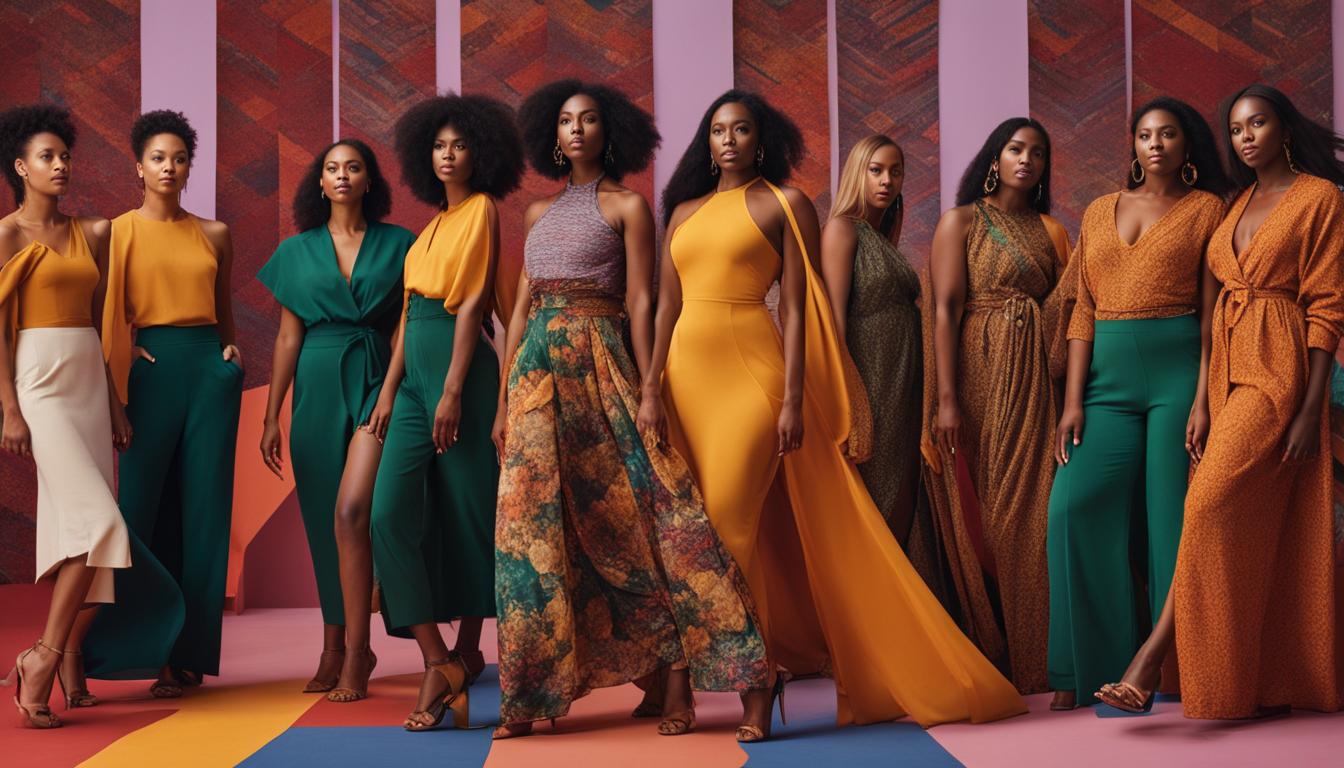
Sustainable Fashion Brands for Natural Materials
When it comes to sustainable fashion, many brands are making a conscious effort to prioritize natural materials in their clothing. By using eco-friendly fabrics like organic cotton, bamboo, and hemp, these brands are reducing their environmental impact and promoting sustainable practices. Natural materials have a range of benefits, from being renewable and biodegradable to requiring fewer chemical treatments during production.
One of the key advantages of using natural materials in sustainable fashion is their renewable nature. Organic cotton, for example, is grown without the use of harmful pesticides and synthetic fertilizers, making it a healthier and more sustainable alternative to conventional cotton. Bamboo is another popular choice, known for its fast growth rate and natural resistance to pests, eliminating the need for chemical treatments. Hemp, a durable and versatile fiber, requires minimal water and is naturally resilient to pests, making it a highly sustainable option.
Choosing eco-friendly fabrics also means reducing the need for harmful chemical treatments. Unlike synthetic materials, natural fibers have inherent properties that make them less prone to requiring harsh chemical processes for dyeing and finishing. This not only benefits the environment by reducing chemical pollution but also ensures that the clothing is safer for both the consumers and the workers involved in the production process.
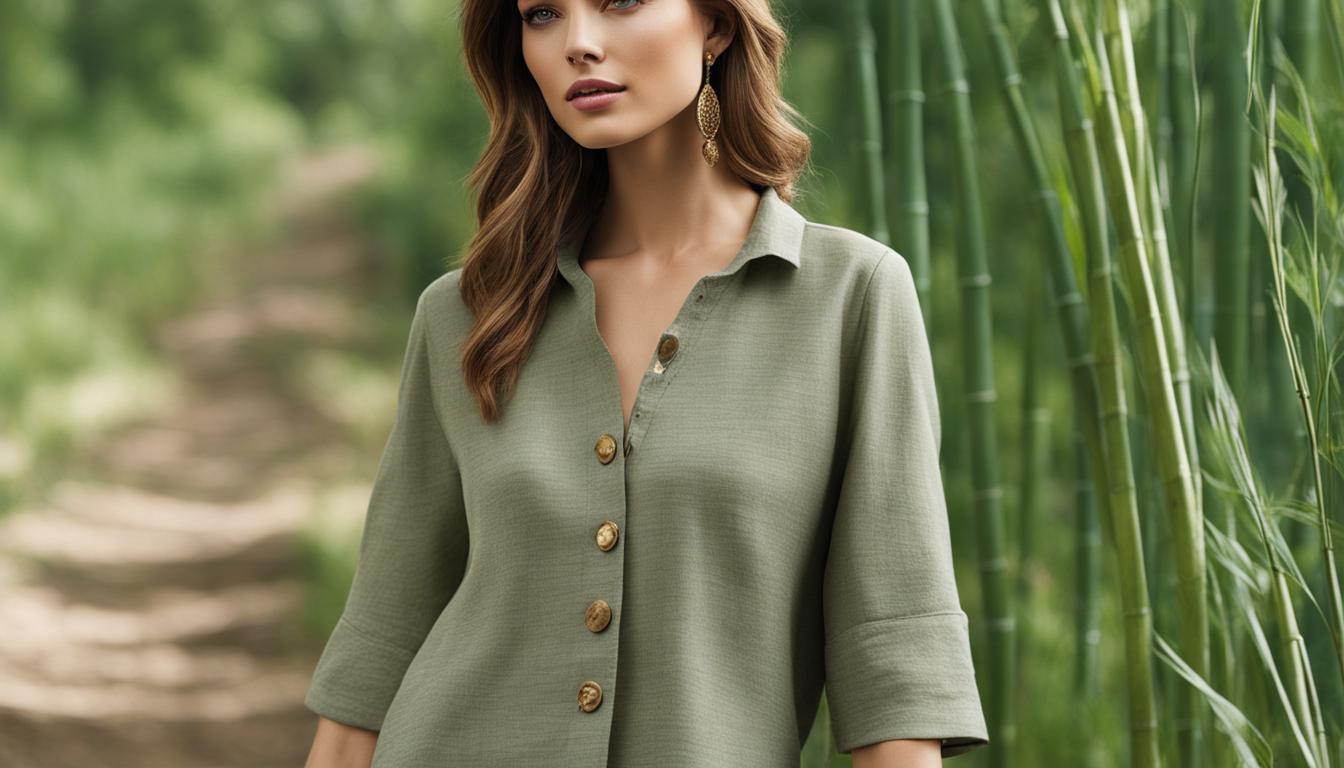
Key Points:
- Sustainable fashion brands prioritize the use of natural materials in their clothing.
- Eco-friendly fabrics like organic cotton, bamboo, and hemp are renewable and biodegradable.
- Natural materials require fewer chemical treatments during production, reducing environmental impact.
- Choosing natural fibers promotes safer and healthier clothing options.
“By using eco-friendly fabrics like organic cotton, bamboo, and hemp, sustainable fashion brands are reducing their environmental impact and promoting sustainable practices.”
By opting for sustainable fashion brands that prioritize natural materials, consumers can make a positive impact on the environment and support a more eco-friendly fashion industry. These brands are proving that style and sustainability can go hand in hand, offering clothing options that are both fashionable and responsibly sourced. With an increasing demand for sustainable fashion made from natural materials, the industry is moving towards a more sustainable and conscious future.
Fair Trade and Ethical Sustainable Fashion Brands
In the world of sustainable fashion, ethics and fair trade play a crucial role in ensuring that clothing is produced under fair labor standards. Fair trade sustainable fashion brands prioritize transparency and accountability, working towards a more equitable and sustainable fashion industry.
These brands go beyond the surface of sustainability and delve into the social impact of their practices. By adhering to fair trade principles, they ensure that the workers involved in the production process are treated fairly and paid a living wage. This commitment to fair labor standards creates a positive ripple effect, uplifting communities and empowering individuals.
One notable example is Brand X which prides itself on its fair trade practices. The brand works directly with artisans in developing countries, providing them with fair wages and safe working conditions. They also support community development projects, such as education initiatives and healthcare services, to create a sustainable and thriving ecosystem.
The Impact of Ethical Fashion Brands
“We believe that fashion should not come at the expense of human lives and dignity. By choosing ethically-made clothing, consumers can make a difference in the lives of garment workers and contribute to a more sustainable fashion industry.” – Founder of Brand X
By supporting fair trade and ethical fashion brands, consumers can align their values with their fashion choices. They have the power to drive positive change and encourage the industry to prioritize fair labor practices. Together, we can create a fashion industry that not only embraces sustainability but also values the rights and wellbeing of all individuals involved.
Sustainable Fashion Brands using Recycled Materials
Reducing waste and minimizing environmental impact are crucial aspects of sustainable fashion. Many forward-thinking brands are leading the way by creatively repurposing materials and incorporating recycled elements into their clothing. By using recycled materials, these brands not only contribute to a circular fashion economy but also create stylish and sustainable clothing options for consumers.
Brands like Renewal Workshop and Patagonia are pioneers in using recycled materials in their collections. Renewal Workshop takes discarded garments and transforms them into high-quality, like-new pieces through repair, cleaning, and upcycling processes. On the other hand, Patagonia has a long-standing commitment to sustainability and offers a range of products made from recycled materials, such as recycled polyester and reclaimed cotton. These brands prove that fashion can be both environmentally conscious and fashionable.
Quotes:
“We believe that waste is a design flaw. By incorporating recycled materials into our clothing, we are not only reducing waste but also creating unique and sustainable pieces that our customers love.” – Renewal Workshop
“Using recycled materials is just one step towards a more sustainable future. By offering products that are durable and repairable, we aim to minimize our impact on the environment and inspire others to do the same.” – Patagonia
Benefits of Using Recycled Materials in Fashion:
- Reduces the demand for virgin materials, conserving natural resources
- Diverts waste from landfills and incineration, reducing greenhouse gas emissions
- Promotes a circular economy by extending the lifespan of materials
- Encourages innovation and creativity in the fashion industry
- Raises awareness about the importance of recycling and sustainable consumption
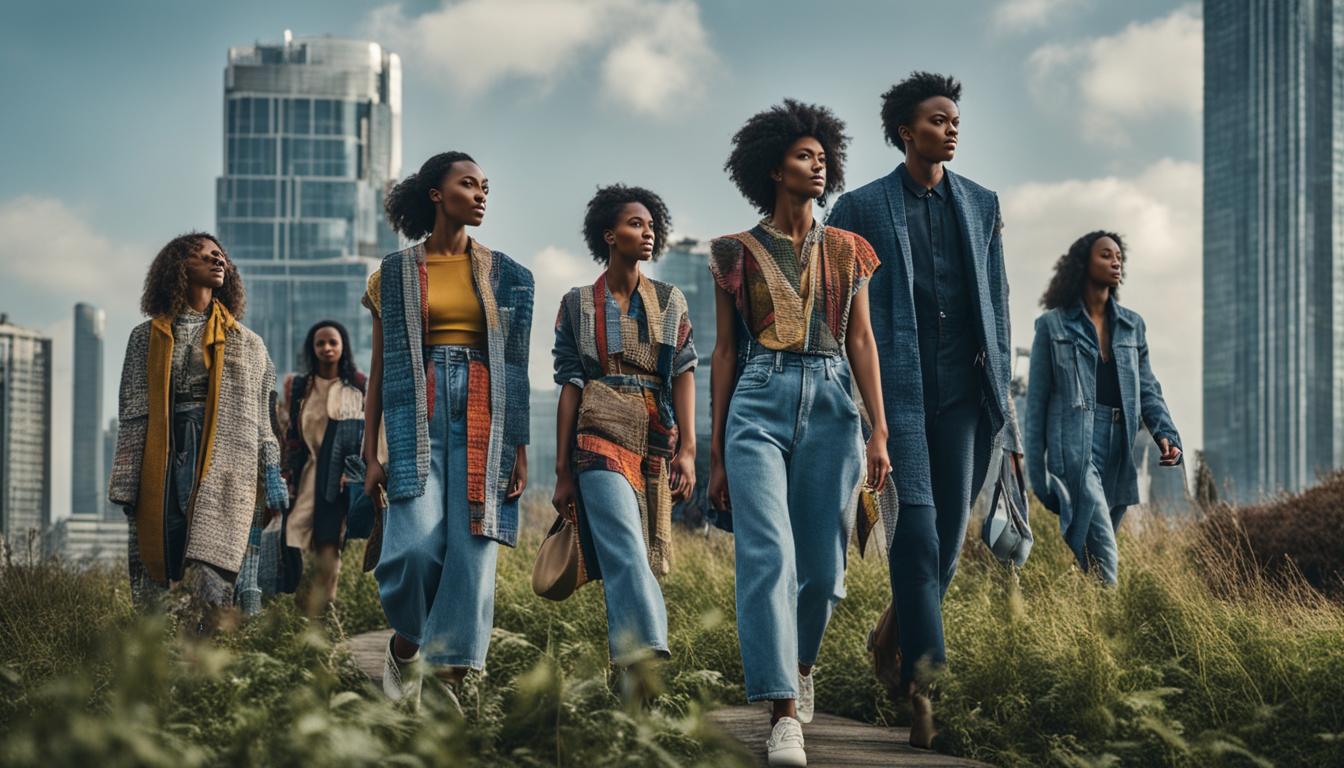
By choosing sustainable fashion brands that utilize recycled materials, consumers can actively support the movement towards a more environmentally friendly and ethical industry. These brands demonstrate that fashion can be beautiful, functional, and sustainable, proving that recycled materials are not just a trend but a crucial part of a more sustainable future.
Sustainable Fashion Brands with Certified Eco Labels
Many sustainable fashion brands hold certifications and eco-labels that verify their commitment to sustainable practices. These certifications include Fair Trade, Global Organic Textile Standard (GOTS), and OEKO-TEX Standard 100. Brands with these certifications ensure that their clothing meets specific environmental and social criteria, giving consumers confidence in their sustainability claims.
The Fair Trade certification guarantees that the brand upholds fair labor standards, ensuring that workers involved in the production process are treated ethically and paid fair wages. It also supports community development projects, creating positive impacts on the lives of workers and their communities.
The Global Organic Textile Standard (GOTS) is another significant certification that ensures the organic status of textiles, from harvesting of raw materials to environmentally and socially responsible manufacturing. GOTS-certified brands use organic fibers and avoid the use of harmful substances throughout the production process.
OEKO-TEX Standard 100 certification focuses on the absence of harmful substances in textile products. This certification guarantees that the clothing is free from harmful chemicals, such as pesticides, heavy metals, and formaldehyde, making it safer for both consumers and the environment.
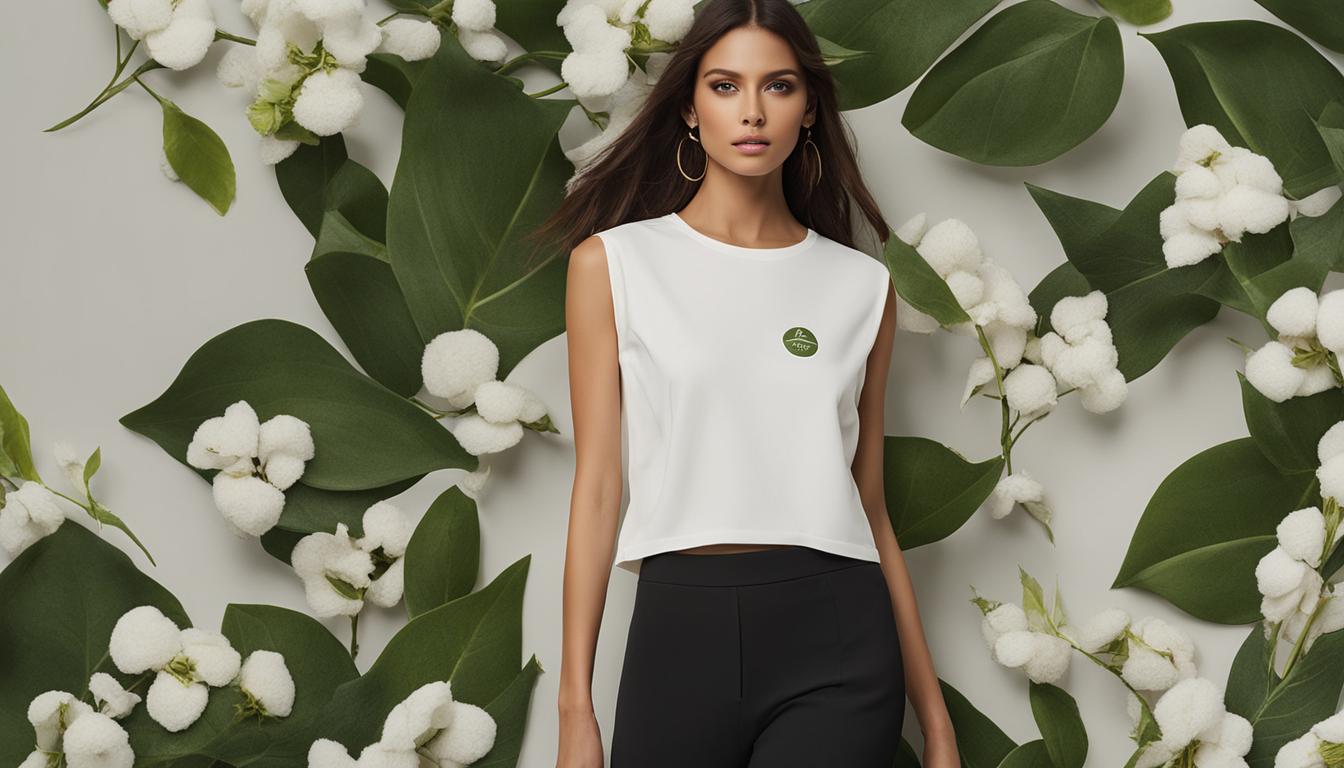
The Importance of Eco-Labels
Eco-labels play a vital role in the sustainable fashion industry by providing transparency and accountability. They enable consumers to make informed choices and support brands that align with their values. Sustainable fashion brands with certified eco-labels demonstrate their commitment to ethical and eco-friendly practices, ensuring that their clothing is made with respect for both people and the planet.
“Eco-labels provide consumers with a reliable way to identify and support sustainable fashion brands. They give us confidence that the clothing we purchase meets specific environmental and social standards. By choosing brands with certified eco-labels, we can make a positive impact on the fashion industry and contribute to a more sustainable future.”
Consumers play a crucial role in driving the demand for sustainable fashion, and eco-labels provide a clear indication of a brand’s sustainability efforts. By supporting brands with certified eco-labels, consumers can actively participate in promoting a more sustainable and ethical fashion industry.
In the next section, we will explore the impact of sustainable fashion brands on communities and the various social initiatives they undertake to make a positive difference.
Sustainable Fashion Brands’ Impact on Communities
Sustainable fashion brands are not only focused on environmental sustainability but also on making a positive impact on communities. Through various initiatives, these brands aim to create opportunities for marginalized groups, support local artisans and farmers, and contribute to community development projects. By prioritizing social initiatives alongside their eco-friendly practices, sustainable fashion brands are driving positive change in the fashion industry.
One way sustainable fashion brands impact communities is by creating employment opportunities for marginalized groups. They often work with local artisans and provide fair wages and safe working conditions. By empowering these individuals, sustainable fashion brands contribute to poverty alleviation and economic growth in communities around the world.
Additionally, sustainable fashion brands support community development projects. They invest in infrastructure improvements, education, and healthcare, which have long-lasting benefits for the local population. This holistic approach to sustainability ensures that their impact goes beyond fashion and positively affects the overall well-being of communities.
The Power of Collaboration
Sustainable fashion brands understand that collaboration is key to creating a lasting impact. They forge partnerships with local organizations and NGOs to implement social initiatives effectively. By working together, they can address specific community needs and create sustainable solutions that benefit both the environment and the people.
Furthermore, sustainable fashion brands often engage in educational initiatives, raising awareness about sustainable practices and encouraging consumers to make conscious fashion choices. By educating individuals about the importance of sustainable fashion, these brands empower consumers to become agents of change in their own communities.
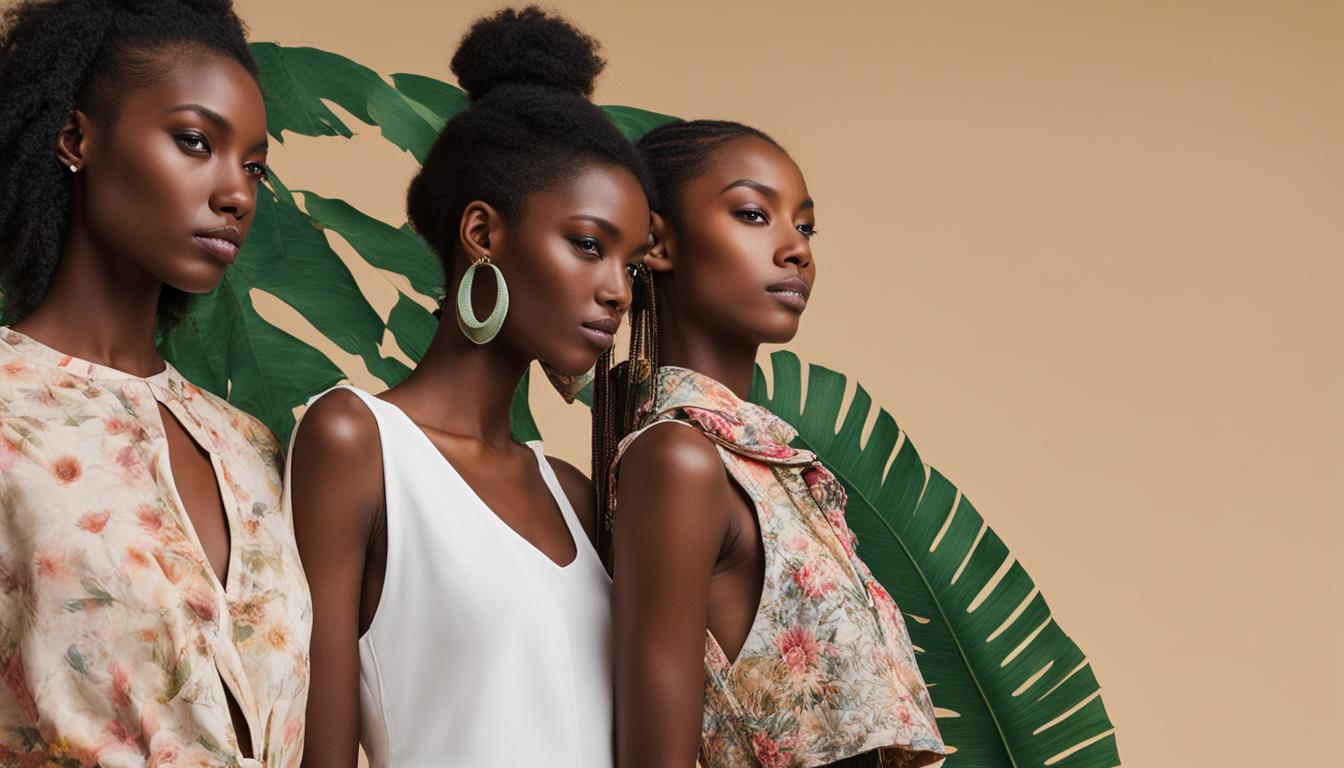
In summary, sustainable fashion brands are not only revolutionizing the fashion industry in terms of eco-friendly practices but also making a significant impact on communities. Through their social initiatives, employment opportunities, community development projects, and educational efforts, these brands are driving positive change and contributing to a more sustainable and inclusive future for all.
Sustainable Fashion Brands with a Circular Fashion Approach
When it comes to sustainable fashion, a circular fashion approach is gaining momentum. This innovative approach focuses on creating a closed-loop system for clothing, minimizing waste and maximizing resource efficiency. Sustainable fashion brands with a circular fashion approach prioritize garment recycling, reusing materials, and embracing sustainable production practices.
By implementing closed-loop systems, these brands aim to extend the lifespan of clothing and reduce the need for constant production. They actively participate in garment recycling initiatives, transforming old garments into new ones or repurposing them for other uses. This not only reduces textile waste but also minimizes the environmental impact associated with the production of new clothing.
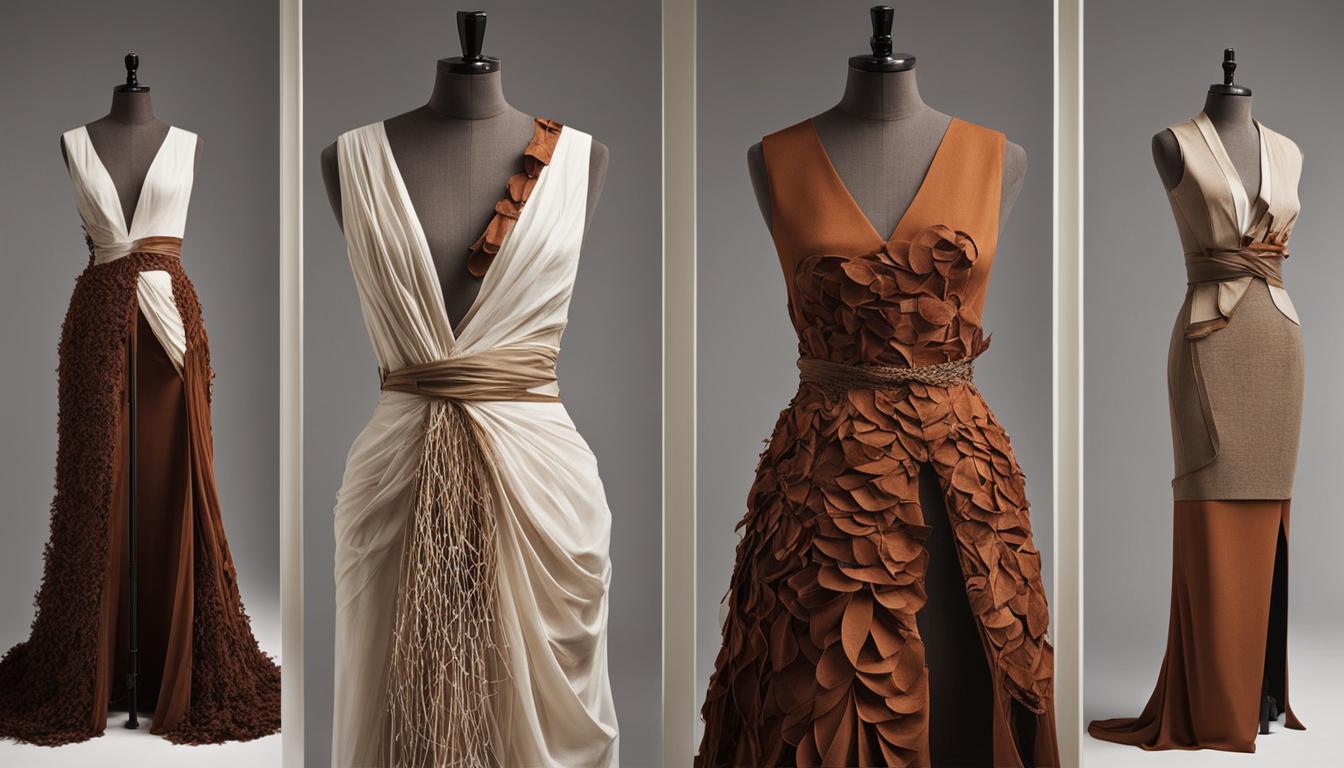
Additionally, sustainable fashion brands with a circular fashion approach emphasize the use of sustainable materials. They opt for eco-friendly fabrics made from recycled or regenerated fibers, such as recycled polyester or Tencel® Lyocell. By choosing these materials, they contribute to reducing the demand for virgin resources and mitigating the industry’s carbon footprint.
Overall, the circular fashion approach adopted by these sustainable fashion brands is paving the way for a more sustainable and responsible industry. By prioritizing garment recycling, reducing waste, and embracing sustainable materials, they are making significant strides towards a fashion industry that operates in harmony with the environment.
Supporting Small Business Sustainable Fashion Brands
When it comes to sustainable fashion, supporting small businesses is an important part of the movement. Independent sustainable fashion brands often have a strong commitment to ethical and eco-friendly practices, offering unique and artisanal clothing options. By choosing to purchase from these brands, consumers can contribute to a more sustainable and diverse fashion industry.

Small business sustainable fashion brands are driven by a passion for creating clothing that is both stylish and environmentally conscious. They prioritize sustainable production processes, using eco-friendly materials and reducing waste throughout their supply chains. By supporting these brands, you can be confident that your purchase is making a positive impact on the planet.
What sets small business sustainable fashion brands apart is their attention to detail and commitment to craftsmanship. Each piece is carefully designed and crafted with the utmost care and consideration. By choosing to support these brands, you are not only investing in high-quality clothing, but also supporting the livelihoods of talented artisans and designers.
The Benefits of Supporting Small Business Sustainable Fashion Brands
- Unique and artisanal clothing options
- Ethical and eco-friendly practices
- Supporting local artisans and designers
- Reducing environmental impact
- Investing in high-quality and durable clothing
“Small business sustainable fashion brands prioritize sustainable production processes and offer unique clothing options that are both stylish and environmentally conscious.”
By supporting small business sustainable fashion brands, you are contributing to a more sustainable future for the fashion industry. Your conscious decision to choose ethical and eco-friendly clothing helps drive positive change and encourages larger companies to embrace sustainable practices. Together, we can create a fashion industry that values both style and sustainability.
Conclusion
In conclusion, sustainable fashion brands are at the forefront of transforming the fashion industry by promoting ethical and eco-friendly practices. These brands prioritize sustainability in their production processes, materials sourcing, and supply chains, making a positive impact on the planet.
By choosing sustainable fashion, consumers have the power to support fair labor practices and protect the environment. The impact of sustainable fashion goes beyond making a fashion statement; it is a conscious decision to contribute to a more sustainable fashion industry.
Through the use of natural materials, recycling and upcycling, fair trade principles, and circular fashion approaches, sustainable fashion brands are paving the way for a more environmentally and socially conscious future. Not only do these brands prioritize the well-being of the planet, but they also prioritize the well-being of communities and strive to create positive change.
By supporting these brands, consumers play an active role in the sustainability movement and help shape the future of fashion. With their commitment to ethical and eco-friendly practices, sustainable fashion brands are leading the way towards a more responsible and inclusive industry.
FAQ
What is sustainable fashion?
Sustainable fashion refers to clothing that is produced and consumed in an environmentally and socially responsible manner. It prioritizes ethical production practices, the use of eco-friendly materials, and fair labor standards.
What are slow fashion brands?
Slow fashion brands are those that prioritize ethical production and sustainable practices. They focus on creating timeless designs and high-quality essentials that can be worn for years, reducing the need for constant consumption.
Are sustainable fashion brands expensive?
No, sustainable fashion doesn’t have to come with a high price tag. Many brands offer affordable options that prioritize sustainability without compromising on style or quality.
Do sustainable fashion brands cater to all body sizes?
Yes, many sustainable fashion brands offer size-inclusive options. They prioritize diversity and inclusivity, ensuring that everyone can find sustainable clothing that fits their style and size.
What materials are used in sustainable fashion?
Sustainable fashion brands prioritize the use of natural materials like organic cotton, bamboo, and hemp. These materials are renewable and biodegradable, reducing environmental impact.
What is the importance of fair trade in sustainable fashion?
Fair trade ensures that workers involved in the production process are treated fairly and paid a living wage. Sustainable fashion brands prioritize fair labor standards and transparency throughout their supply chains.
How do sustainable fashion brands use recycled materials?
Sustainable fashion brands creatively repurpose materials like plastic bottles, old clothing, and fabric scraps to create stylish and sustainable clothing options. This reduces waste and minimizes environmental impact.
What certifications do sustainable fashion brands have?
Sustainable fashion brands often hold certifications and eco-labels like Fair Trade, Global Organic Textile Standard (GOTS), and OEKO-TEX Standard 100. These verify their commitment to specific environmental and social criteria.
How do sustainable fashion brands make a positive impact on communities?
Sustainable fashion brands aim to create opportunities for marginalized groups, support local artisans and farmers, and contribute to community development projects. They prioritize social and economic wellbeing in addition to environmental sustainability.
What is circular fashion?
Circular fashion is an approach that focuses on creating a closed-loop system for clothing. Brands with a circular fashion approach prioritize garment recycling, reusing materials, and minimizing waste in their production processes.
Why is supporting small business sustainable fashion brands important?
Supporting small business sustainable fashion brands contributes to a more sustainable and diverse fashion industry. These brands often have a strong commitment to ethical and eco-friendly practices and offer unique and artisanal clothing options.
How can I make a positive impact through sustainable fashion?
By supporting sustainable fashion brands, consumers can contribute to a more sustainable fashion industry and protect the environment. Choosing sustainable fashion is a conscious decision to support fair labor practices and reduce environmental harm.

